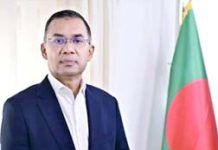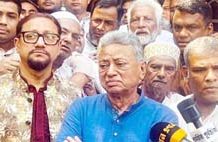C T Online Desk: Poor skills in the Bangla language are evident in almost all spheres of life though the nation has to its credit the glorious history of the 1952 Language Movement.
Even 12 years of learning Bangla at the primary, secondary and higher secondary levels as a compulsory subject, students cannot achieve the desired skills in their mother tongue, especially in writing, despite the presence of laws and a High Court directive in promoting the language.
In their later life in academic or professional areas, students fail to show the minimum desired skills in the mother tongue, committing even silly mistakes in answer scripts for academic entrance examinations, official letters and documents, posters, banners, media productions, novels and even in textbooks.
A wrong approach to achieving skills in the language, lack of qualified teachers, proper planning, literature reading and awareness as well as negligence in learning Bangla and giving priority to acquiring English language skills are the key reasons for the situation, observed senior educationists, writers and experts.
Senior government officials also acknowledged poor skills in Bangla.
The passion for the mother tongue the people of Bangladesh had during the Language Movement has gradually declined to a miserable level, observed renowned educationist, author and former Dhaka University Bangla professor Abul Kasem Fazlul Haque.
Kasem, now the university’s Ahmad Sharif Chair professor, said that though the founding president of Bangladesh, Sheikh Mujibur Rahman, had taken initiatives for writing everything in Bangla, later no significant step was taken for the development of the language.
Eminent writer and Bangla Academy president Selina Hossain told New Age that more awareness was needed to achieve skills in Bangla.
‘Parents teach their children the Bangla alphabet first at home and then teachers teach them the language in schools and colleges. They both need to be careful in teaching the language,’ she said, adding, ‘Students should also be careful while learning Bangla.’
The High Court, after hearing a writ petition filed in public interest by Supreme Court lawyer Md Eunus Ali Akond on February 17, 2014, asked the government to ensure the use of Bangla in all hoardings, signs, nameplates and vehicle number plates.
The court in its order also asked the government to explain why its failure to implement the Bangla Language Introduction Act 1987 would not be declared illegal.
Gross violations of the law and the directive are experienced everywhere every day, including from lanes, by-lanes to highways.
In written form, spelling mistakes are very common across the country while sharp criticisms were voiced recently following mistakes in textbooks, including spelling errors.
Most of the university admission seekers keep failing to qualify in English and Bangla, two basic and compulsory subjects, in the competitive admission tests, including for enrolment at Dhaka University.
According to Professor Syed Azizul Huq, chairman of the Bangla department at Dhaka University, Bangla is not used purely and properly in the education, administration or judicial sector or even by writers and journalists.
‘If government documents contain mistakes in Bangla, it is not regarded as a big issue, but mistakes in English come as a matter of prestige,’ he said, mentioning that there was a tendency in the 1960s to name children, houses and administrative entities in Bangla, which is now absent.
National Curriculum and Textbook Board member for curriculum, Professor Md Moshiuzzaman said that students, under the previous curriculum, memorised their lessons but did not learn how to implement what they learnt as emphasis was not placed on practical skills.
‘That’s why people commit spelling mistakes in office files, documents or letters even after getting many degrees,’ he said.
According to International Mother Language Institute director general Professor Hakim Arif, many Bangladeshis have problems with reading and writing Bangla though they have learnt the language up to Class XII.
Professor Syed Azizul Huq said that the present situation was a result of two major reasons — an improper education system and not giving importance and paying respect to Bangla.
‘We are neglecting our mother tongue,’ he said, adding, ‘We do not pay the attention to learning Bangla which we pay to learning English or other foreign languages.’
Instead of using Bangla everywhere, people of Bangladesh are rather removing the language from everywhere while English is occupying that place, he observed.
‘English is necessary for jobs, communication, economy and education,’ the Bangla professor went on to observe, adding that people need to learn the mother tongue first.
‘If you don’t love your own language, then what development you’re looking for?’ he asked.
According to Dhaka University Institute of Education and Research professor M Tariq Ahsan, the traditional teaching process in Bangladesh is mechanical where grammar is taught through memorisation.
Tariq, also a member of the National Curriculum Development and Revision Core Committee, said that grammar was taught here without having its impact in practical life.
‘If grammar is life-oriented, then students will achieve better language skills,’ he said, adding, ‘In Bangladesh, the culture of achieving language skills through reading literature is also absent.’
Because of all these factors, people cannot acquire good skills in Bangla even after the language is a compulsory subject in the curriculum for all classes up to the higher secondary level, he added.
Abul Quasem Fazlul Haque mentioned that before independence of the country there was an entity called Bangla Unnayan Board — to facilitate educationists and authors to write books in Bangla for higher education and translate English books into Bangla.
Later, he pointed out, Bangla Academy replaced the board, but the academy has been busy taking care of the government’s different desires instead of working to improve the language.
Mentioning some countries — France, Germany, Italy, he said that these countries give more importance to their own languages than English.
‘Bangla is our mother language and the state should use Bangla everywhere in its own interest,’ he added.
Professor Syed Azizul Huq said that it was a responsibility for all — from the government to the NCTB, Bangla Academy, IMLI, all educational institutions, the administration and the judiciary — to promote the use of Bangla.
‘We are observing February 21 as a formality, but nothing can be gained through mere formalities,’ he said, adding that Bangla would be in a respectable place as a result of sincere and heartfelt efforts only.
Professor M Tariq Ahsan also said that good quality of teachers for teaching students Bangla at the primary level was a challenge as they were appointed without a proper background.
Under the new curriculum, students would learn by understanding and expressing, which could, as expected, reduce the challenges in achieving skills in Bangla, he added.
NCTB member Professor Mohammad Moshiuzzaman also said that under the new skilled-based curriculum students would learn by themselves and use their knowledge in the classroom, following which the learning would be proper.
‘I hope that the problems will be solved in these ways,’ he further said.
‘As our institute is new, we could not give much importance to the Bangla language,’ IMLI director general Professor Hakim Arif said.
The then prime minister, Sheikh Hasina, laid the foundation stone of the institute in 2001 and inaugurated the institute bhaban in 2010.















